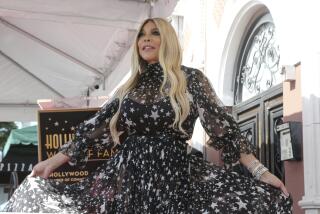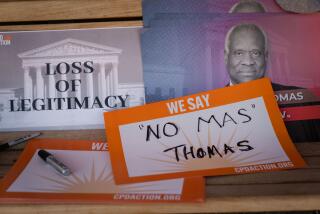Ruth Bader Ginsburg and Fred Rogers documentaries hail soft voices behind powerful messages
She adorns her judicial robes with fashionable collars, including a special, embellished ruffle she wears on days she dissents from the decisions being handed down. He was known for changing from a coat to a cardigan sweater, a signal to the children watching his television show that he was there to spend time with them.
Shy in the spotlight, intelligent, well-mannered, steadfast in their beliefs, agents of change, subjects of parody, Supreme Court Justice Ruth Bader Ginsburg and television personality Fred Rogers are the subjects of separate, lauded documentaries opening this summer.
“Won’t You Be My Neighbor?” (June 8) looks at the life and legacy of (Mr.) Rogers, the popular PBS children’s series host who forged a one-on-one relationship with generations of children by looking directly into the camera, addressing them singularly and making them feel safe and valued.
“Kids were his ministry, and television was just his pulpit,” the film’s director, Morgan Neville, says. “Fred was always thinking about the child at the other end of the screen.”
FULL COVERAGE: 2018 Summer Movie Sneaks »
Ginsburg’s mission, as seen in “RBG” (May 4), has centered on winning equal rights for women, a pursuit that began in earnest with a handful of key cases she argued as an attorney before the Supreme Court in the 1970s.
Seeing her long legal legacy has proved revelatory for festival audiences, says Julie Cohen, who co-directed “RBG” with Betsy West, adding that even those arriving at screenings wearing the popular T-shirts and tote bags featuring the 85-year-old Ginsburg’s image have come away with a deeper understanding of her life.
“She has become this kind of cult figure with the Kate McKinnon impression on ‘Saturday Night Live,’ but a lot of people don’t know how important she has been for decades, putting women and men on equal footing before the law,” Cohen says.
Ginsburg speaks softly, as did Rogers, who died in 2003 from stomach cancer. The documentaries take pains to point out the care they took in choosing their words, Ginsburg in her arguments and rulings, Rogers with his messages to children.
“Clowns and balloons are adult ideas of what children would like,” Rogers said. Eschewing noisy staples of children’s television programming, Rogers valued a slow-paced directness that didn’t dodge weighty subjects like death and divorce.
Kids were his ministry, and television was just his pulpit.
— Morgan Neville
“Some people think of Fred as simple, but his show was anything but simple,” Neville says. “Every script was annotated by child development people, and every line was rewritten and fretted over and considered. And he never condescended. He knew kids were smart and deserved to be talked to honestly about the bad things that are part of life.”
In addition to chronicling Ginsburg’s methodical approach to winning rights for women (“It was like knitting a sweater,” one observer notes), “RBG” sports a moving love story between Ginsburg and her husband, Marty. They met while students at Harvard Law School. “He was the first boy I ever knew who cared that I had a brain,” Ginsburg says. They remained married — quite happily so, judging from the adoring archival interviews — until he died in 2010.
“Whenever she talks about him, her face lights up,” West says, noting that access to home movies taken during the couple’s honeymoon and early married life proved essential to telling her story in full.
The filmmakers also made room for Ginsburg’s close friendship with the late conservative Justice Antonin Scalia. The two rarely agreed on issues but never let their debates become personal. In fact, they both admitted their disagreements sharpened their own arguments . Cohen and West found that inspirational, lamenting that Scalia died shortly before they could interview him for the documentary.
“Their friendship is just mind-blowing in this time where sometimes we’re so divided we can’t even listen to each other,” Cohen says. “I think it’s something we should all aspire to.”
Neville, whose music movie “20 Feet from Stardom” won the 2014 Academy Award for documentary, sees “Won’t You Be My Neighbor?” as his most contemporary film, even though Rogers began his career more than half a century ago.
“Fred’s idea of kindness feels like a radical notion with so much coarseness in television and politics today,” Neville says. “It’s much easier to control people or make money off of people through divisiveness and fear. There’s no kindness lobby. Nobody stands up for kindness. So if I can help do that by amplifying Fred’s soothing voice, then I’m all for it.”
READ MORE: See the full list of summer release dates »
More to Read
Only good movies
Get the Indie Focus newsletter, Mark Olsen's weekly guide to the world of cinema.
You may occasionally receive promotional content from the Los Angeles Times.







